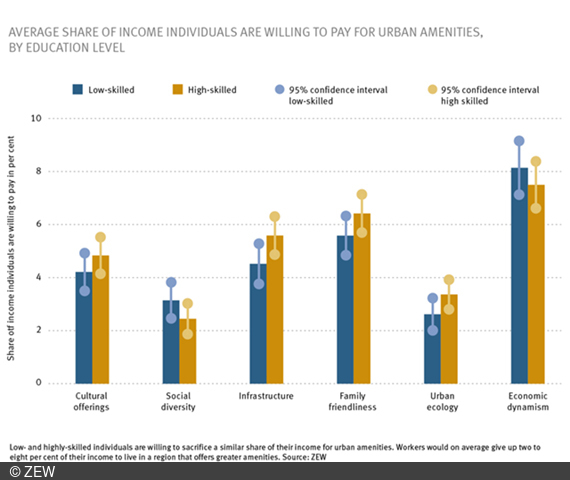Low-Skilled Workers Are Less Able to Afford to Live in the City of Their Preferred Choice
ResearchGiven a shortage of skilled labour, cities are increasingly vying for qualified workers. A higher quality of life is often said to give cities an advantage in this battle for talent. In fact, the amenities a city offers in terms of family friendliness, infrastructure, cultural offerings and regional economic dynamics play a major role in employees’ decision to move to a particular city. A study by ZEW Mannheim comes to the conclusion that high- and low-skilled workers prefer very similar cities. The lower share of low-skilled workers in attractive urban areas thus mainly reflects the fact that low-wage earners are less able to afford to move to attractive cities due to the high cost of living.
“The common assumption in research and politics is that cities can attract highly qualified people, for example, by improving their cultural amenities. However, there is no reliable evidence for this so far,” says Professor Melanie Arntz, labour market expert at ZEW Mannheim and co-author of the study. A ZEW research team therefore used an experimental research design to investigate whether improving the amenities of a location really attracts more skilled workers. The test persons were asked to choose between randomly generated job offers in two fictitious cities. These differed only in terms of earnings and a number of location-specific qualities, while all other factors such as relocation costs and rents remained the same.
Strong economic regions are in high demand
The researchers found that workers would give up an average of two to eight per cent of their income to live in a region that offers greater amenities.
Among a set of six major urban characteristics, the economic development of a region turns out to be the most important factor when choosing a location. Employees would give up about eight per cent of their income to live in a region with high employment growth and many new companies. “Such regions raise the hope of being able to increase one’s income in the future and to be better protected against unemployment,” Arntz explains.
Other location-specific factors also turned out to be relevant. For a good school education and sufficient childcare provision, employees would give up an average of six per cent of their wages. For a better infrastructure, i.e. good transport connections, and available housing, both higher and lower qualified people would accept on average six per cent less income. A rich cultural offer is also important to employees. Compared to a region with poor offerings, they would give up five per cent of their wages to have a greater cultural offer. The openness and tolerance of a city, on the other hand, is considered less important by the respondents. According to the results of the survey, professionals would accept only two per cent less pay for a more socially diverse city.
Low educated workers disadvantaged
Contrary to previous assumptions, however, this study shows that both higher and lower qualified workers have very similar preferences when it comes to urban amenities and thus favor very similar cities. The majority of respondents are willing to sacrifice comparable shares of their income to move to a region with a higher quality of life, regardless of education level. “Nevertheless, we often observe a significantly higher share of skilled professionals in attractive urban centres. Wages for high-skilled workers tend to be much higher in these cities, which offsets the higher cost of living. Less qualified workers, on the other hand, cannot fully compensate for the higher costs with a higher income. As a result, lower-income workers are often discouraged from moving to attractive cities, which ultimately exacerbates the differences in regional living conditions,” explains ZEW economist Arntz. To bridge this gap between higher and lower educated workers, the researchers propose a housing policy that creates affordable housing also in attractive urban areas.


